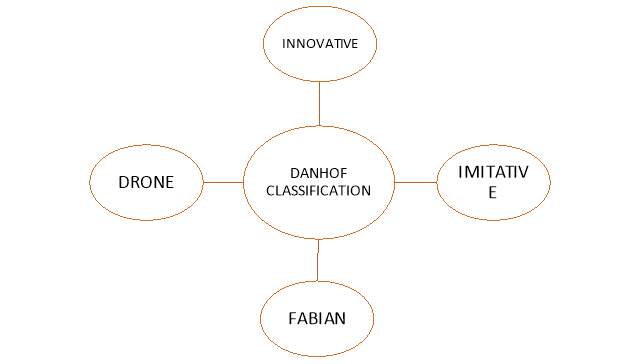An interesting distinction about types of entrepreneurs is the one proposed by the author Clarence Danhof, which classified entrepreneurs into four groups based on economic development. He based his classification on his study of American agriculture, and he observed that entrepreneurs could be classified depending upon the level of willingness to create innovative ideas; so there can be the following types of entrepreneurs:
- Innovative: an aggressive assemblage and synthesis of information and the analysis of results deriving from new combination of factors of production characterize this type of entrepreneurship. These entrepreneurs have the ability to think newer, better and more economical ideas of business organization and management. They are characterized by the smell of innovativeness, and they are aggressive in experimentation and in putting attractive possibilities into practice. An innovative entrepreneur sees the opportunity for introducing a new technology, a new product or a new market. Schumpeter’s entrepreneur was of this type. They are business leaders and contributors to the economic development of a country, as they are very much helpful for their country because they bring about a transformation in life style.
- Adoptive/Imitative: the imitative entrepreneurs copy or adopt suitable innovations made by the innovative entrepreneurs. These entrepreneurs imitate the existing entrepreneurs and setup their enterprise in the same manner. Instead of innovating, they just imitate the technology and methods innovated by others. These entrepreneurs face lesser risks and uncertainty then innovative entrepreneurs. While innovative entrepreneurs are creative, imitative entrepreneurs are adoptive. They imitate innovative entrepreneurs because the environment in which they operate is such that it does not permit them to have creative and innovative ideas on their own. For example, this kind of entrepreneur is particularly important in developing regions because they contribute significantly to the development of such economies. Imitative entrepreneurs are most suitable for the developing regions because in such countries people prefer to imitate the technology, knowledge and skill already available in more advanced countries. Imitative entrepreneurs help to transform the system of those countries with the limited resources available.
- Fabian: the dictionary meaning of the term ‘fabian’ is ‘a person seeking victory by delay rather than by a decisive battle’; in fact, this kind of entrepreneurs are timid, cautious and a little bit lazy. This type of entrepreneurs are not interested in introducing new changes or desiring to adopt new methods of production innovated by the most entrepreneurs. They are very much skeptical in their approach in adopting or innovating new technology in their enterprise and they love to remain in the existing business with the age-old techniques of production. They adopt new technologies only when there are not options left to survive in the business venture. Usually they are second-generation entrepreneur in a business family enterprise.
- Drone: the dictionary meaning of the term ‘drone’ is ‘a person who lives on the labor of others’. Drone entrepreneurs refuse to copy or use opportunities that come on their way. In fact, these entrepreneurs are very conservative; they always feel comfortable with their old-fashioned technology of production even though the environment as well as the society have undergone considerable changes and they are even ready to suffer the loss of their business. They are laggards as they continue to operate in their traditional way and resist changes.
